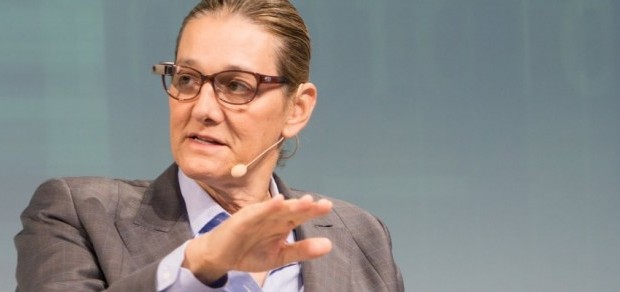Live Forever. Digitally.
José Antonio Simón
Have you ever wondered what a Renaissance man would look like in the 21st century? Look no further than Martine Rothblatt. Perhaps best known for founding Sirius satellite radio, she is currently the CEO of United Therapeutics and, according to Forbes, the highest-paid female CEO in the United States. She is also a transgendered woman as well as an activist, futurist, technology philosopher and medical ethicist. One cannot help but feel a mix of envy and admiration while pondering her résumé as she begins her keynote presentation for the Interactive portion of South by Southwest. And yet, all these emotions leave one’s mind as she begins her discussion with New York Magazine contributing editor, Lisa Miller. “There will be continued advances in software that we see throughout our entire life; eventually, these advances in software will rise to the level of consciousness,” she says, and we pause. Countless thinkers and artists have proposed this idea before, but what is most interesting about this notion—aside from the fact that it is being presented as the future—is that it is framed as the natural evolution to the selfie: the next logical step in humanity’s self-obsession. Wait: am I vain and self obsessed? Perhaps. It seems to me, however, that this vanity is precisely what would make me feel uncomfortable about her vision.
Rothblatt goes on to suggest that each person will have a mind clone; a virtual self that will exist in parallel to their originator. This idea is obviously at odds with what is presented in most Hollywood films, yet comforting in its utopian spirit. She explains that a mind clone would not only be our best friend, but also our most telling mirror. Sometimes useful as a tool, able to perform tasks we do not wish to, while at the same time possessing the same emotional programming that is currently found in our biological selves so as to be able to advise us. Had I not been in the back of an auditorium filled with thousands of techies, I would have liked to ask why and how. Perhaps she was not there to convince us as much as to tantalize us into buying her book, Virtually Human, and I admit I have caved; I have too many unanswered questions.
As they continue to converse, Lisa Miller shares the story of an interaction she had with Bina48, the robot created by Rothblatt in the image of her wife, Bina, that had also been programmed with an approximation of the original’s personality. When asked about the human Bina, she attempts to dodge the question, but when pressed she eventually admits that the Bina48 is perhaps an unwanted guest and an incomplete sketch of the original, and that it is unfair that she should have such an incomplete likeness. That she wished she too could go out into the garden. Whoa. It’s one thing to listen to the concept of a consciousness that exists outside of the flesh, and it is quite another to hear its insights and feelings. Once the chills dissipated, I wondered why this champion for the virtualization of humanity had not chosen to build a simulation of herself. Moreover, I wonder if we will truly reach a point where the line between the cybernetic and human mind is indistinguishable. Assuming that we will, one has to wonder what a disembodied consciousness would be, what it would feel like.
In examining human life, one discovers early on that bodies are central to the experience of being human. What is a human being without hormones and instincts? It seems that in the vision presented by Rothblatt, these would be simulated, or perhaps imitated. Furthermore, having the opportunity to manufacture a consciousness with any traits imaginable, why would we choose to recreate a flesh-bound mind? Being romantic about the human experience seems superfluous at this stage. Her friend Patricia Kluge has been quoted as saying: “Bright people don’t talk about these things. The body is but a shell. It’s the mind and the heart that count.” Ironically, Rothblatt professes to practice the religion of unity while seemingly perpetuating the Judeo-Christian notion that the body is separate from the mind. Indeed, the idea of replicating ourselves brings many practical and philosophical issues to bear. Is it possible to transmit a corporeal lesson we have learned; for example, the classic first encounter with fire? Can what we have learned from physical suffering be transmitted to a virtual self with no sense of corporeal distress? How would the idea of time change for a being of eternity?
To me, the greatest issue is how this affects the value of human life. Uniqueness has been and remains central to the valuation of what surrounds us. So imagine that life could not only be created as easily as I write this article, but that you could recreate several copies of yourself. What if seven entities could hold the memory of your parents playing with you in your living room as a baby, or your first kiss were to be distributed and felt equally amongst your selves, or your grandfather’s last days recounted to you by your computer. There is no doubt a vast amount of richness that can be derived from this creation as our own limits would disappear, and humanity’s knowledge would likely increase exponentially, as we could simply compute all of life’s problems easily and with unlimited capacity. The greatest appeal is that we would live forever, something that everyone has considered and most people desire; but the matter of cost seems too high in this case. Living forever would be moot if life were less significant.
Despite all this, I cannot help but feel admiration for what that Martine Rothblatt has achieved and lived. Curiosity has driven her to great success as the founder of satellite radio, to father three children while she was male, to change genders, begin work on cloning organs, develop treatments for pulmonary hypertension to save one of her own children… The list continues, and millions of people have already benefitted from her achievements, which is why it is ironic that her list of accomplishments is what gives her license to present a world vision that would render her entire past insignificant. I would never seriously consider cloning my mind and have it live in a cybernetic space, and yet I know as I finish this article that I will continue to ponder it incessantly. Perhaps I am self-obsessed.
 José Antonio Simón es editor y colaborador de Literal. Dirige el podcast Literally Everything. Su Twitter es @jaymusica
José Antonio Simón es editor y colaborador de Literal. Dirige el podcast Literally Everything. Su Twitter es @jaymusica
Posted: April 5, 2015 at 7:01 am










